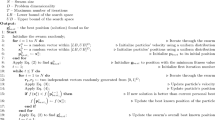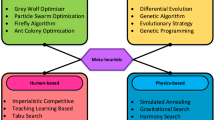Abstract
Although particle swarm optimization (PSO) has successfully applied on many global optimization problems, it is prone to premature convergence due to its monotonic and static learning pattern for all individuals. Furthermore, few purposeful operator is proposed to help population jump out of potential local optimum. To address the drawbacks and improve the comprehensive performance of PSO, we propose a sophisticated PSO (SopPSO) based on multi-level adaptation and purposeful detection. In SopPSO, a particle not only updates its learning model according to its fitness landscape, but also periodically re-selects target dimensions that the particle learns from its neighbors. The adaptive strategy applied in multi-level (i.e., individual level and dimension level) endows PSO with a more accurate simulation on emergent collective behaviors. In addition, a tabu detecting and a local searching strategies based on some historical information are proposed to help the population to jump out of local optima and improve the accuracy of solutions, respectively. The extensive experimental results illustrate the effectiveness and efficiency of the proposed strategies. Furthermore, the comparison results between SopPSO and other peer algorithms on different problems verify its favorable performance on unimodal, multimodal and large-scale problems as well as some real applications.


Similar content being viewed by others
References
Angeline PJ (1998) Using selection to improve particle swarm optimization. In: Proceedings of IEEE congress on evolutionary computation, pp 84–89
Bergh VD, Engelbrecht AP (2004) A cooperative approach to particle swarm optimization. IEEE Trans Evol Comput 8(3):225–239
Cheng R, Jin YC (2015) A social learning particle swarm optimization algorithm for scalable optimization. Inf Sci 291(6):43–60
Eberhart R, Shi Y (2000) Comparing inertia weights and constriction factors in particle swarm optimization. In: Proceedings of IEEE congress on evolutionary computation, CEC’00, San Diego, CA, USA, pp 84–88
Higashi H, Iba H (2003) Particle swarm optimization with Gaussian mutation. In: Proceedings of IEEE symposium on swarm intelligence, pp 72–79
Jin X, Liang YQ, Tian DP, Zhuang FZ (2013) Particle swarm optimization using dimension selection methods. Appl Math Comput 219(10):5185–5197
Kennedy J (1999) Small worlds and mega-minds: effects of neighborhood topology on particle swarm performance. In: Proceedings of IEEE congress on evolutionary computation, pp 1931–1938
Kennedy J, Eberhart RC (1995) A new optimizer using particle swarm theory. In: Proceedings of the sixth international symposium on Micro machine and Human Science, pp 39–43
Kennedy J, Eberhart RC (1995) Particle swarm optimization. In: Proceedings of IEEE international conference on neural network. pp 1942–1948
Kennedy J, Mendes R (2002) Population structure and particle swarm performance. In: Proceedings of IEEE congress on evolutionary computation, pp 1671–1676
Latorre A, Muelas S, José-María Peña (2013) Large scale global optimization: experimental results with MOS-based hybrid algorithm. In: Proceedings of IEEE congress on evolutionary computation, pp 2742–2749
Li C, Yang S, Nguyen TT (2012) A self-learning particle swarm optimizer for global optimization problems. IEEE Trans Syst Man Cybern B Cybern 42(2):627–646
Liang JJ, Suganthan PN (2005) Dynamic multi-swarm particle swarm optimizer. In: Proceedings of IEEE symposium on swarm intelligence, pp 124–129
Liang JJ, Qin AK, Suganthan PN et al (2006) Comprehensive learning particle swarm optimizer for global optimization of multimodal functions. IEEE Trans Evol Comput 10(3):281–295
Ling SH, Iu HHC, Chan KY et al (2004) Hybrid particle swarm optimization with wavelet mutation and its industrial applications. IEEE Trans Syst Man Cybern B Cybern 34(2):997–1006
Li X, Tang K, Omidvar M, Yang Z, Qin K (2013) Benchmark functions for the cec’2013 special session and competition on large scale global optimization. Technical report, Evolutionary Computation and Machine Learning Group, RMIT University, Australia
Liu J, Tang K (2013) Scaling up covariance matrix adaptation evolution strategy using cooperative coevolution. In: Proceedings of the 14th international conference on intelligent data engineering and automated learning, pp 350–357
Li XD, Yao X (2012) Cooperatively coevolving particle swarms for large scale optimization. IEEE Trans Evol Comput 16(2):210–224
Lynn N, Suganthan PN (2015) Heterogeneous comprehensive learning particle swarm optimization with enhanced exploration and exploitation. Swarm Evol Comput 24:11–24
Marco A, Montes dO, Thomas S et al (2009) Frankenstein’s PSO: a composite particle swarm optimization algorithm. IEEE Trans Evol Comput 13(5):1120–1132
Mendes R, Kennedy J, Neves J (2004) The fully informed particle swarm: simpler, maybe better. IEEE Trans Evol Comput 8(3):204–210
Molina D, Herrera F (2015) Iterative hybrization of DE with local search for the CEC’2015 special session on large scale global optimization. In: Proceedings of IEEE congress on evolutionary computation, pp 1974–1978
Peram T, Veeramachaneni K, Mohan CK (2003) Fitness-distance-ratio based particle swarm optimization. In: Proceedings of IEEE symposium on swarm intelligence, pp 174–181
Qin AK, Huang VL, Suganthan PN (2009) Differential evolution algorithm with strategy adaptation for global numerical optimization. IEEE Trans Evol Comput 13(2):398–417
Ratnaweera A, Halgamuge SK, Watson HC (2004) Self-organizing hierarchical particle swarm optimizer with time-varying acceleration coefficients. IEEE Trans Evol Comput 8(3):240–255
Sarkar K, Bhattacharyya SP (2013) Single string based global optimizer for geometry optimization in strongly coupled finite clusters: An adaptive mutation-driven strategy. J Chem Phys 139(7):074106
Sayah S, Hamouda A (2013) A hybrid differential evolution algorithm based on particle swarm optimization for nonconvex economic dispatch problems. Appl Soft Comput 13(4):1608–1619
Sedki A, Ouazar D (2012) Hybrid particle swarm optimization and differential evolution for optimal design of water distribution systems. Adv Eng Inform 26(3):582–591
Shi Y, Eberhart RC (1998) A modified particle swarm optimizer. In: Proceedings of IEEE world congress on computational intelligence. pp 68–73
Shi Y, Eberhart RC (2001) Fuzzy adaptive particle swarm optimization. In: Proceedings of IEEE congress on evolutionary computation, pp 101–106
Soh H, Ong YS, Nguyen QC, Nguyen QH et al (2010) Discovering unique, low-energy pure water isomers: memetic exploration, optimization and landscape analysis. IEEE Trans Evol Comput 14(3):419–437
Swagatam D, Suganthan PN (2010) Problem definitions and evaluation criteria for the CEC 2011 competition on testing evolutionary algorithm on real world optimization problems. Nanyang Technological Univ., Singapore, Tech. Rep
Wachowiak MP, Smolikova R, Zheng YF et al (2004) An approach to multimodal biomedical image registration utilizing particle swarm optimization. IEEE Trans Evol Comput 8(3):280–288
Wang Y, Cai ZZ, Zhang QF (2011) Differential evolution with composite trial vector generation strategies and control parameters. IEEE Trans Evol Comput 15(1):55–66
Wei C, He Z, Zhang Y et al. (2002) Swarm directions embedded in fast evolutionary programming. In: Proceedings of IEEE congress on evolutionary computation, pp 1278–1283
Xia XW, Liu JN, Hu ZB (2014) An improved particle swarm optimizer based on tabu detecting and local learning strategy in a shrunk search space. Appl Soft Comput 23(5):76–90
Xu G (2009) An adaptive parameter tuning of particle swarm optimiztion algorithm. Appl Math Comput 219(9):4560–4569
Yang ZY, Tang K, Yao X (2008) Large scale evolutionary optimization using cooperative coevolution. Inf Sci 178(15):2985–2999
Zhan ZH, Zhang J, Li Y et al (2009) Adaptive particle swarm optimization. IEEE Trans Syst Man Cybern B Cybern 39(6):1362–1381
Zhan ZH, Li Y, Shi YH (2011) Orthogonal learning particle swarm optimization. IEEE Trans Evol Comput 15(6):832–847
Zhang J, Sanderson AC (2009) JADE: adaptive differential evolution with optional external archive. IEEE Trans Evol Comput 13(5):945–958
Zhao SZ, Liang JJ, Suganthan PN et al. (2008) Dynamic multi-swarm particle optimizer with local search for large scale global optimization. In: Proceedings of IEEE congress on evolutionary computation, pp 3845–3852
Zheng YJ, Ling HF, Guan Q (2009) Adaptive parameters for a modified comprehensive learning particle swarm optimizer. Math Probl Eng 68(3):939–955
Acknowledgements
This studywas funded by the NationalNatural Science Foundation of China (Nos. 61663009, 61602174, 61562028), the National Natural Science Foundation of Jiangxi Province (Nos. 20161BAB202064, 20161BAB212052, 20151BAB207022) and the National Natural Science Foundation of Jiangxi Provincial Department of Education (Nos. GJJ160469, GJJ150496).
Author information
Authors and Affiliations
Corresponding author
Ethics declarations
Conflict of interest
The authors claim that none of the material in the paper has been published or is under consideration for publication elsewhere. And all authors declare that they have no conflict of interest.
Ethical approval
This article does not contain any studies with human participants or animals performed by any of the authors.
Additional information
Communicated by V. Loia.
Rights and permissions
About this article
Cite this article
Xia, X., Wang, B., Xie, C. et al. A sophisticated PSO based on multi-level adaptation and purposeful detection. Soft Comput 22, 2603–2618 (2018). https://doi.org/10.1007/s00500-017-2514-x
Published:
Issue Date:
DOI: https://doi.org/10.1007/s00500-017-2514-x




